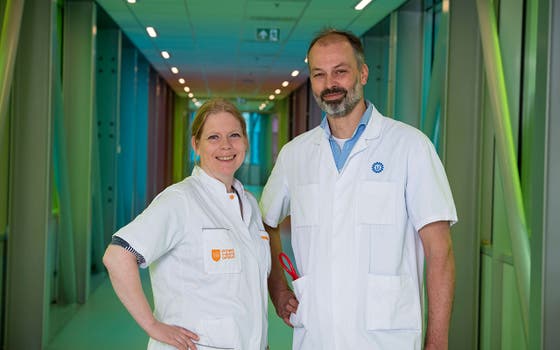New gene therapy reimbursed for children with MLD

New gene therapy is reimbursed for children with a very rare metabolic disease (MLD). MLD is a severe genetic disease caused by a mistake in DNA. This gene therapy is the only effective treatment for a severe variant of MLD in which children deteriorate rapidly. The Dutch government recently started reimbursing this therapy for patients who have no symptoms yet.
Lees artikel in het Nederlands >
Young children with the rare metabolic disease MLD can now survive thanks to this new treatment. The gene therapy was developed in Milan by academic centres and a pharmaceutical company. It is a one-off treatment with the product 'Libmeldy'. It applies to children with a severe form who do not yet have symptoms. For patients who already have symptoms, it will be investigated whether they can start treatment via conditional access. UMC Utrecht and Amsterdam UMC have collaborated to enable access to this treatment.
For the Netherlands, a few children per year qualify for this treatment, which takes place at the Stem Cell Transplantation Centre for Children in Utrecht. This is a collaborative initiative of the Princess Máxima Centre for Paediatric Oncology and The Wilhelmina Children's Hospital where stem cell transplants for patients with metabolic disease take place. Recently, Utrecht became one of five stem cell transplant centres in Europe for this treatment. The leukodystrophy centre of Amsterdam UMC, as an international Centre of Expertise of MLD, is heavily involved.
Peter van Hasselt, head of metabolic diseases, Wilhelmina Children's Hospital, said: "This new form of stem cell transplantation is more powerful than regular stem cell transplantation and enables treatment for the most severe forms of this metabolic disease for whom until recently there were no treatment options. This makes it so important that this treatment is now available in the Netherlands. We hope that this more powerful form will also make treatment possible for a number of other metabolic diseases."
Caroline Lindemans, stem cell transplant physician at the Prinses Máxima Centre: "Fantastic that the expertise within the joint stem cell transplant centre of UMC Utrecht and the Prinses Maxima Centre also provides the space to enable innovative gene therapies for children with non-malignant diseases."
Gene problem
Metachromatic leukodystrophy (MLD) is a rare, inherited metabolic disease caused by a fault in a gene. Harmful fats accumulate, damaging the brain and nerves. For the first few years, patients have no symptoms, but from the first symptoms they continue to deteriorate. That moment and the degree of disease varies from patient to patient. The more severe the gene defect, the earlier and the faster the disease progresses. Walking, talking, hearing and vision gradually deteriorate. A child who walks at first may end up in a wheelchair at some point. Painful muscle cramps and epilepsy may also occur. Eventually, MLD patients respond very little to their environment. Many children die at a young age.
Therapy
In MLD, a certain enzyme is broken. All body cells can make, secrete and absorb that enzyme. Gene-modified stem cell transplantation takes advantage of this fact. Doctors isolate stem cells from the patient's bone marrow and then send them to an external laboratory where the pharmaceutical company alters the stem cells so that the cells do make the missing enzyme. Afterwards, the child gets his own processed stem cells back through an infusion. This makes a good enzyme available again from transplant and allows the body to break down the harmful fats. In this treatment, the stem cells are the patient's own. This prevents serious complications that can occur during stem cell transplantation with donor cells. For the future of treating children with this rare disease, gene therapy with the patient's own stem cells is promising.
